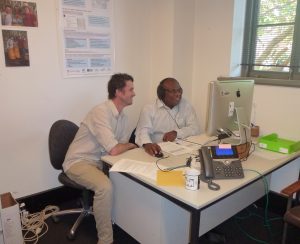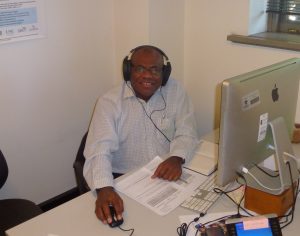Written by Steven Gagau and Jodie Kell
As part of a project to improve the metadata of PARADISEC’s Papua New Guinea collections made possible with funding from the Australian National Data Service (ANDS), PARADISEC has welcomed Steven Gagau into the Sydney office. Steven was engaged as a Research Assistant to provide language support for the project. Steven’s key role is listening to PNG collections held in the PARADISEC catalogue to find out more about the recordings and record this information into the catalogue.

Steven can be seen here with Nick Ward from PARADISEC
Steven’s role involves listening to recordings of people speaking and singing and then documenting details about the content of the collections specific to the items. He verifies the catalogue details in Title, Description, Dates, Subject and Content languages, Regions and Villages and locates on language maps. He further determines the discourse types such as language play, oratory, report, procedural, formulaic, interactive, narrative or singing.
He then edits the data and updates directly the PARADISEC catalogue for metadata enrichment thus contributing to enhancing the knowledge and information of these materials held.
Steven’s initial work was on the extensive collection recorded by Dr. Thomas (Tom) Dutton in the Kuanua language of the “Tolai” people of the Gazelle Peninsula of East New Britain Province. Dr. Dutton was a linguist with the Australian National University between 1969 and 1997. Prior to taking up linguistics Dutton was an Education Officer in the Administration of Papua and New Guinea. His many books include studies on Papuan languages and the collection digitised by PARDISEC includes his fieldwork tape recordings and other recordings developed to accompany his language learning publications.
Lately, Steven has been working on the materials in the catalogue by collectors from various regions with their language and cultural groups in PNG guided by the database of the Summer Institute of Linguistics (SIL) of PNG. Given his local knowledge of Papua New Guinea, he is able to identify the language and cultural groups to improve the metadata materials in the catalogue collections. He is now reviewing tape collections from Divine Word University (DWU) in Madang, PNG where there are a wide variety of items and discourse types being verified and enhanced in the catalogue.
Steven has extended his language and cultural knowledge to Melanesia Region where he is now involved with Vanuatu and Solomon Islands collections and can enhance the metadata in Bislama (Vanuatu) and Pijin (Solomon Islands) languages similar to Tok Pisin where are usually referred to as Melanesian Pidgin languages and are lingua franca languages in these countries.
Steven originates from Viviran Village in the Toma area of the Gazelle Peninsula of East New Britain Province, PNG. He now lives in the Gosford area, Central Coast, NSW. He is an engineer by profession and was educated in PNG with further qualifications in Australia. He has worked in various managements roles across industries in telecommunications, construction, education, the development sector and quality systems management. More recently he has moved his focus to management consulting with community and research based organisations in Australia for projects in PNG and other Pacific countries. Currently he is looking into collaborative projects with organisations in Australia in socio-cultural and economic sectors as well as capacity building and institutional strengthening programs.
Steven is very actively involved in PNG community organisations in Australia. He is the President of the Sydney Wantok Association https://www.facebook.com/sydneywantok/ a community organisation serving the PNG community in Sydney and NSW but also including Melanesian countries such as Solomon Islands, Vanuatu and New Caledonia. The term “Wantok” is the common language or identifier of the people across these countries that can even include the Torres Strait Islands.
Steven is also engaging with other Sydney based community organisations such as the NSW Council for Pacific Communities (NSWCPC) for the Pacific diaspora activities and the Sydney Alliance organisation who are the representative of civil society advancing the common good. He also gets involved with multiculturalism and affiliates to Multicultural NSW.
Steven is a Rotarian and is a Project Manager under the Rotary Australia World Community Service (RAWCS). In 2016, Steven initiated and completed a community project in the Trobriand Islands, Milne Bay Province, PNG. This involved installing solar power and water tanks to primary school and nearby elementary schools in the area.
Steven is also a member of the Management Committee of the PNG Association of Australia (PNGAA) https://pngaa.org/site/(website) and https://www.facebook.com/groups/PNGAA/ (Facebook) and he is involved with many of the activities and events of the association, that recognises the long standing relationship and bond between the two countries historically as well as from contemporary perspectives. The PNGAA’s aims include supporting friendly and positive relationships between the people of PNG and Australia and the preservation of historical material related to Papua New Guinea.
It was through the PNGAA that the opportunity to be involved with PARADISEC arose when the project coordinator Nick Ward approached the Association enquiring about people interested in working with the archival material. Steven was interested as the work was culture based and he wanted to make a contribution to his country, his language group and to the people of his culture. He has also contributed by advertising within the community so that PARADISEC now has a list of members of the local PNG community who can be called on in the future when positions like this arise.
Steven says of the work, “I fully support the objectives of PARADISEC in the preservation of culture and language through good documentation and as a repository of materials of ongoing information resources for all users including researchers, and for people of that culture and language group to have access to. There may be changes in modern times in the particular traditional cultural and language groups but with such collections and correct metadata captured it saves the cultures and languages for future generations.”

 Follow
Follow
Here at Endangered Languages and Cultures, we fully welcome your opinion, questions and comments on any post, and all posts will have an active comments form. However if you have never commented before, your comment may take some time before it is approved. Subsequent comments from you should appear immediately.
We will not edit any comments unless asked to, or unless there have been html coding errors, broken links, or formatting errors. We still reserve the right to censor any comment that the administrators deem to be unnecessarily derogatory or offensive, libellous or unhelpful, and we have an active spam filter that may reject your comment if it contains too many links or otherwise fits the description of spam. If this happens erroneously, email the author of the post and let them know. And note that given the huge amount of spam that all WordPress blogs receive on a daily basis (hundreds) it is not possible to sift through them all and find the ham.
In addition to the above, we ask that you please observe the Gricean maxims:*Be relevant: That is, stay reasonably on topic.
*Be truthful: This goes without saying; don’t give us any nonsense.
*Be concise: Say as much as you need to without being unnecessarily long-winded.
*Be perspicuous: This last one needs no explanation.
We permit comments and trackbacks on our articles. Anyone may comment. Comments are subject to moderation, filtering, spell checking, editing, and removal without cause or justification.
All comments are reviewed by comment spamming software and by the site administrators and may be removed without cause at any time. All information provided is volunteered by you. Any website address provided in the URL will be linked to from your name, if you wish to include such information. We do not collect and save information provided when commenting such as email address and will not use this information except where indicated. This site and its representatives will not be held responsible for errors in any comment submissions.
Again, we repeat: We reserve all rights of refusal and deletion of any and all comments and trackbacks.